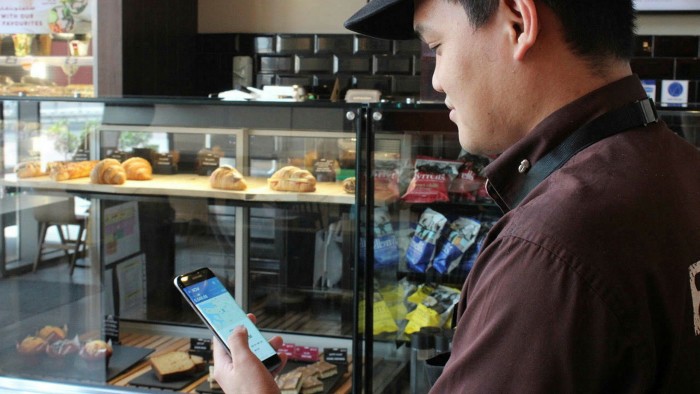Pandemic brings surge in business for Middle East’s fintechs

Simply sign up to the Fintech myFT Digest -- delivered directly to your inbox.
Some of the world’s strictest lockdowns and restrictions were imposed across the Gulf states to combat coronavirus. They caused havoc across oil-reliant economies already hit by low crude prices.
But, as elsewhere around the world, the region’s emerging technology firms were big beneficiaries from a surge in ecommerce activity as customers sheltered at home.
The payment platforms behind the shift from bricks-and-mortar to digital commerce have dominated the region’s emerging fintech scene, some supported by larger telecoms companies. Early last year, e-payments surged in Saudi Arabia, the Gulf’s largest market, after customers were allowed to use debit cards — rather than less-common credit cards — for online transactions.
The burgeoning market has attracted overseas interest in the digital infrastructure underpinning financial technology. Western Union last month said it would invest up to $200m for a 15 per cent stake in STC Pay, the fast-growing payments arm of Saudi Telecom Company, the Riyadh-listed giant controlled by the kingdom’s sovereign wealth fund.
Regional payments are dominated by Payfort, a Dubai-based start-up sold to Amazon in 2017, the same year that the US company became the region’s dominant ecommerce player with the acquisition of local incumbent rival Souq.
Others are emerging as independent rivals to Amazon. Telr, a Dubai-based payment company, has quickly developed a product that allowed even the most modest neighbourhood grocery to operate through the pandemic. Merchants without a website could send payment links for customers wanting to avoid cash.
Hyperpay, a Saudi-based platform, increased revenues three times through the first three months of the pandemic as customers switched to online retail. The payment gateway, founded in 2014, launched a product to allow marketplace merchants to send fast, end-to-end payments via one platform to users — be they vendors, drivers, freelancers or service providers. The service allowed smaller merchants in the kingdom to compete with dominant international apps, as delivery-based services became vital in sustaining people through Covid restrictions.
“Hyperpay has been driven by these last-mile fulfilment services, and continues to fill in gaps in payment capabilities,” says Khaldoon Tabaza, founder of Jordan-based venture capitalist firm iMena, and an investor in Telr and Hyperpay.
The rapid adoption of online financial services through the pandemic has come from a low base — the Middle East still only represents 1 per cent of global fintech investment, according to a report on the sector by the Milken Institute.
But the sector is growing 30 per cent a year in a region where tech-savvy youth are quick to adopt new technologies. In 2017, 30 fintech companies raised $80m in venture capital funding; by 2022, that is expected to rise to more than $2bn from 465 companies, the report says, citing data from DIFC Fintech Hive and Accenture.
As well as powering ecommerce, fintech is bolstering financial inclusion as advances in technology enables services to reach millions of people overlooked by established banks and wealth managers.
Bringing basic financial services to 25m low-income workers in the Gulf states has been pioneered by start-ups including Now Money and Go Rise. Such fintech companies hope to get a cut of the massive $150bn a year remittances leaving the Gulf for homes in Asia and Africa, while “democratising” banking access for migrant labourers.

The Middle East’s middle classes are another opportunity. “Across Saudi Arabia and the UAE, middle classes want access to wealth management, but no one has been really catering to them. The wealthy always have solutions — but others now can be helped by robo-advisers,” said Rabih Khoury, chief exit officer at Middle East Venture Partners.
One of MEVP’s portfolio companies is Sarwa, the region’s first regulated automated investment platform. Such robo-advisers use algorithms to provide financial advice, access to products and help clients save by slashing fees and account minimums.”
Nurtured in the fintech accelerator of Dubai’s financial centre, Sarwa developed online know-your-customer protocols to ease account access in a region where clunky compliance procedures have acted as significant barrier for customers, especially the young.

The pandemic highlighted the need for digital applications for clients, says Nadine Mezher, a Sarwa co-founder and its chief marketing officer.
The global market volatility that accompanied the pandemic posed a potential threat to robo-advisers, forcing Sarwa to talk to clients and push out content seeking to educate investors about the need to sustain savings plans through both good and bad times.
The education drive worked: during the first quarter, assets under management grew 100 per cent, with an 80 per cent rise in new account openings. In April, Sarwa attracted three times the assets of the previous year.
Sarwa, which has raised almost $10m over three rounds, closed its series-A round in January, providing a financial cushion to see the start-up through the crisis. “We now have strong backing from top regional and international investors,’ says Ms Mezher. “Sarwa is strengthening its position and working on further progressing with its expansion plan.” The Dubai-based firm, which is expanding operations into Saudi Arabia, is targeting between 10 and 20 per cent month-on-month growth.
Consultants say regulators are drawing up plans to open the entire retail banking segment to digital so-called challenger banks that have emerged elsewhere in the world. As established lenders face the challenge of fintech, legacy providers are increasingly facing the fact that co-operation with fintech start-ups will be vital to their long-term survival.
But many emerging fintech start-ups still complain about the barriers erected to stall development of the sector, especially among established companies nervous about upstart competitors.
Ms Mezher says regulators are increasingly open to change, but urges banks to collaborate more openly with fintech companies for the sector to flourish. “It may be a cliché that start-ups can manoeuvre easily, but banks have to go through bureaucratic hoops,” she says. “So while there is lots of interest to work with start-ups, it isn’t moving that fast.”
Mr Tabaza of iMena agrees that banks remain slow to adapt.
Even the nimblest fintech start-ups across all business models still need to work with established banking enterprises that can take weeks of onerous bureaucratic procedures to open accounts for merchants. “Adaptability and dynamism of legacy banking corporations is a big issue that faces the industry in the region,” he says.

Comments